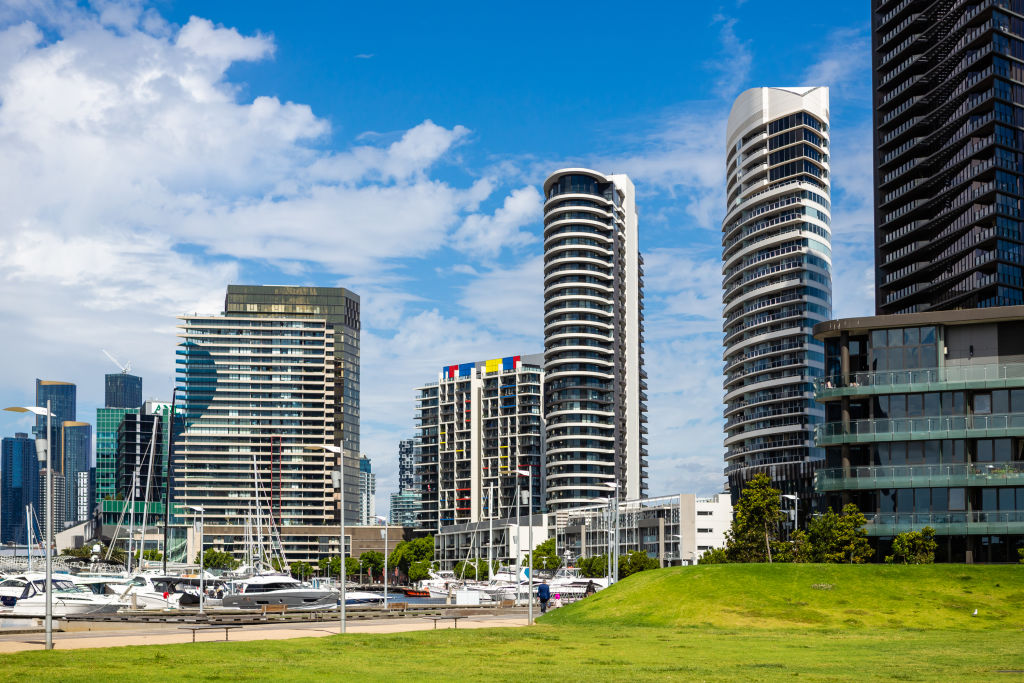
Tenants struggling in a fiercely competitive rental market are unlikely to get any relief in the coming months when international borders reopen, with new data revealing the number of vacant properties to rent is still at an all-time low.
Domain’s latest vacancy rate report showed it is very much a landlord’s market across most of Australia’s capital cities – the number of vacant rental listings is down in every capital city except Darwin – and rental conditions could become even more competitive once the borders open, according to Nicola Powell, Domain’s chief of research and economics.
“Outside Sydney and Melbourne, all rental markets are operating in favour of landlords,” Dr Powell said.
“Melbourne’s vacancy rate is trending downward, which could see a shift towards a landlord’s market if this continues. High vaccination rates and the reopening of international borders could see the rental market become more competitive.”
More competition in already tight rental markets means rent prices are likely to go one way – up.
The latest Finder RBA Cash Rate Survey found the majority of experts are predicting rental prices will increase dramatically as the nation’s borders reopen.

Graham Cooke, head of consumer research at Finder, said renters should start preparing for higher housing costs.
“The pandemic turned the rental market on its head in some areas, with vacancy rates increasing in major capital cities like Sydney and Melbourne.
“As international students and backpackers return to our shores, we’re going to see demand quickly flow back,” he said.
| Vacant Rental Listings Australia: November 2021 | ||
| MOM per cent change | YOY per cent change | |
| Sydney | 4.2% | -29.0% |
| Melbourne | -3.4% | -32.4% |
| Brisbane | -1.8% | -31.4% |
| Perth | 4.3% | -27.3% |
| Adelaide | -7.8% | -42.6% |
| Hobart | -14.3% | -39.0% |
| ACT | 6.3% | -3.9% |
| Darwin | 48.7% | 19.2% |
Source: Domain. The vacancy rate represents the portion of available empty rental properties relative to the total stock of rental property. The rental vacancy rate is based on adjusted Domain rental listings and will be subject to slight revisions over time.
The number of vacant rental listings available in November compared to the same time last year has fallen by 29 per cent in Sydney, 32.4 per cent in Melbourne and 31.4 per cent in Brisbane.
Vacant rentals plunged by a massive 42.6 per cent in Adelaide and 39 per cent in Hobart over the same time.
Nationally, vacancy rates remained steady at 1.5 per cent over the month of November but most of the capital cities are at historical lows. Melbourne’s vacancy rate is at its lowest point since June 2020, Adelaide’s rental market is at its tightest since Domain records began in 2017 and Brisbane and Perth remain at historical lows.
Sydney’s vacancy rate increased over the month of November, although only very slightly, from 2.2 per cent to 2.3 per cent. Canberra and Darwin’s increased as well, also only marginally.November 2021 vacancy rates
| Rental vacancy rates Australia | |||||
| Nov-21 | Oct-21 | Nov-20 | Monthly change | Annual change | |
| National | 1.5% | 1.5% | 2.2% | – | ↓ |
| Sydney | 2.3% | 2.2% | 3.3% | ↑ | ↓ |
| Melbourne | 3.0% | 3.1% | 4.6% | ↓ | ↓ |
| Brisbane | 1.2% | 1.2% | 1.8% | – | ↓ |
| Perth | 0.5% | 0.5% | 0.7% | – | ↓ |
| Adelaide | 0.4% | 0.5% | 0.7% | ↓ | ↓ |
| Hobart | 0.3% | 0.4% | 0.5% | ↓ | ↓ |
| Canberra | 0.9% | 0.8% | 0.9% | ↑ | – |
| Darwin | 0.9% | 0.6% | 0.8% | ↑ | ↑ |
Source: Domain
Mr Cooke said it was likely the inner-city and university suburbs in Sydney and Melbourne would feel the effect of a rental squeeze first.
“It’ll probably be students coming back to traditional university areas like inner-western Sydney – where there’s still a glut of properties and not a lot of students – that will see a difference first,” he said.
“Prices will likely rise to higher levels than what we saw pre-COVID.”
He said there was a small window between now and Christmas for tenants to secure themselves a deal before the market really shifted.
“Right now, you have this window before the borders have opened up; an opportunity to negotiate while you’re still in a position of strength,” he said.
“Tenants could be going to their landlord and saying ‘I want a two-year agreement rather than six or 12 months’.”
He acknowledged higher rent prices would be yet another blow for tenants struggling to enter the property market.
“It’s increasingly difficult to save for a deposit, there’s no doubt about that. That’s why I’d be encouraging tenants to get in now before the borders open and get themselves a good rental deal.”
article by domain.com.au
